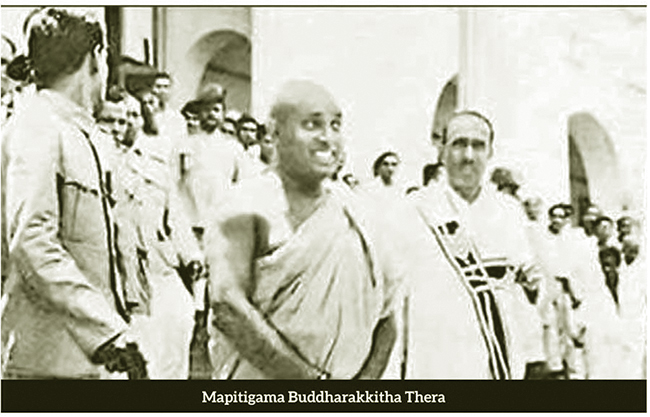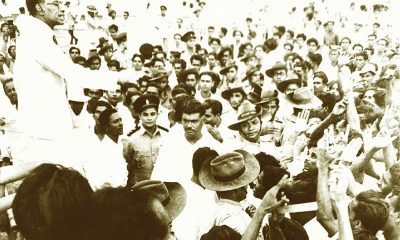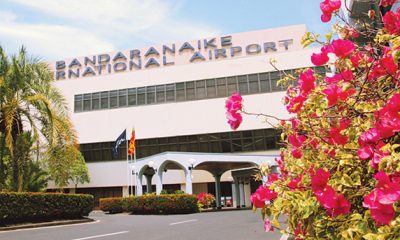Features
Country situation deteriorates, Sir Oliver takes charge, Phillip resigns and PM shot
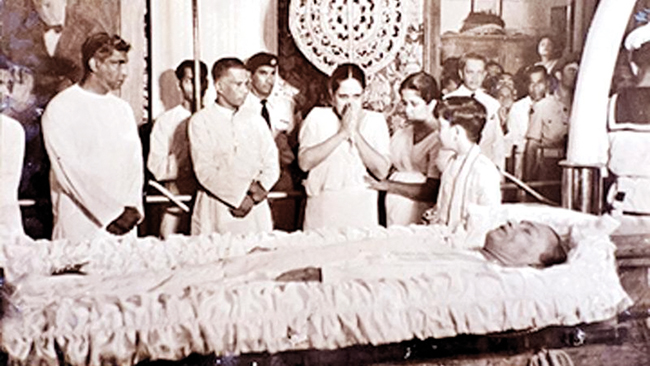
(Excerpted from the Memoirs of a Cabinet Secretary by BP Pieris)
That is the furthest that S.W.R.D.’s Committee was able to go (on the matter of human rights provisions in the constitution). Similar Committees have been periodically appointed by Parliament for the same purpose and they have all failed to complete their task for the obvious reason that Constitutions cannot be discussed, determined and drafted within the lifetime of a session of Parliament, which is approximately twelve months.
S.W.R.D.’s steering of a motley crowd of intellectual political colleagues, assembled as a Joint Select Committee of Parliament, to the signing of a unanimous report, showed much tact and great ability. As Chairman of the Committee, he restrained himself from displaying that greatest quality of his oratory. He was an orator born. Oratory has been defined as a graceful management of the voice, countenance and gesture.
With arms stretch’d forth, of folded, or at rest,
As will’d the power by whom he seem’d possess’d,
With features augur’d all his tongue alleged,
And tones wing’d home each barbed shaft they edged,
And with spontaneous sallies bright and bold,
Resistless streams of oratory roll’d.
On his way back home from the United Nations, he addressed the Diplomatic Corps in New Delhi, where my brother G. S. was Counselor in our Mission. He had spoken without notes as usual, and the general consensus of opinion among the diplomats was that S.W.R.D.’s speech was the best they had ever heard in that hall. My brother thought that this compliment ought to be conveyed to the Prime Minister. When he did so, S.W.R.D. had said, “I’m not surprised, my dear fellow, did you know that I am one of the five best speakers in the World?”
The financial position (of the country) was not improving. With an anticipated budget deficit of nearly Rs 200 million, further loans were being raised. Apart from this and the rising cost of living there was, again, unrest and violence in the country. An emergency meeting of the Cabinet was summoned on May 27, 1958, and at 11 a.m. the Ministers adjourned to Queen’s House to tender advice to His Excellency the Governor-General that a State of Emergency should be proclaimed with effect from 12. 15 p.m. that day under the Public Security Ordinance.
It would be interesting to find out whether the addition of that odd fifteen minutes was for reasons astrological. Probably it was, for no Prime Minister appeared to take a step without consulting the stars. Sir Oliver Goonetilleke now took complete control of the country, obviously with the consent of his weak-kneed Government. He was an excellent man for the job and was, I believe, virtual Dictator. Emergency Regulations were pouring out of the Government Press. Ministers were meeting almost daily, not to transact business, but to be kept informed of what the situation, changing from day to day, was. Violence and arson was everywhere.
In the midst of the Emergency came S.W.R.D.’s third Speech from the Throne. Both Houses of Parliament had to be summoned on June 4, 1958, “in order that you may be informed that a State of Emergency had been declared under the Public Security Ordinance. Both your Houses have had an opportunity of discussing the subject fully.
“I have pleasure in stating that the position continues steadily to improve. My Government is taking all steps necessary to maintain law and order. My Government will also take the measures required to restore peace, goodwill and confidence amongst various sections of the people of the country. In accordance with its Policy, my Government will introduce legislation early for the reasonable use of the Tamil language.”
This last sentence upset the whole of the Tamil community because it was not quite clear that Tamil was to take second place and the Tamils were not prepared to accept that inferior position. They were determined to fight for their rights and eminent leaders to do the fighting were not lacking. They insisted on parity which the Government was not in a position to grant, having made an election promise that, if returned, they would make Sinhala the one official language of the country.
Reference was made in the Speech to the rising cost of living and the Government promised to take certain effective measures to bring it down. I was not aware what these measures were to be. The cost of living continued to rise. All I know is that the Cabinet never sat down to give serious consideration to the problem. The poor man found it difficult to obtain his foodstuffs at reasonable prices within his means. He lived normally on free rice and dried fish, or rice and sambol.
The dried fish was obtainable only at exorbitant prices. To make a sambol, one had to have lime, Maldive fish, chillies, onions and coconut, all of which were obtainable only in the black market. The Cabinet took no effective steps to bring the prices of these essential commodities, essential to the poor man who had put them into power, down to a reasonable level.
The promise in the Throne Speech was implemented and the Tamil Language (Special Provisions) Bill introduced. The uneasiness thus caused in the country made it necessary to extend the emergency for the third month. It was now September and the emergency was in its fourth month, followed later by a fifth month. The import and export of goods through all the ports of the Island and their distribution were declared to be essential services under the emergency law.
The end of 1958 saw the emergency still in operation. 1959 opened with strikes in the Port of Colombo, the Shell Company and the Banks. A token strike by certain sections in the Government as well as in the private sector was threatened. A Committee of Ministers was appointed to keep in day-to-day touch with the situation. It was my experience that these committees never worked because it was impossible to get all the ministers on the Committee together for a meeting. They dilly-dallied with the situation assuming always that, having been returned by the ‘People’, they would be in office for the rest of time. Nothing was done.
Notice was given by unions in the Government as well as in the private sector that there would be more strikes in sympathy and the Secretary to the Treasury drew the attention of all public officers to Administrative Regulation 262 which read: “No officer is allowed to call a public meeting to consider any action of the Government of Ceylon or the Government of any other country or take an active part in such a meeting unless he is authorized to do so in his official capacity with a view to discussion and settlement of points in issue with associations representing special interests etc.”
Officers were reminded that participation in any public meeting called in connection with the Public Security (Amendment) Act would be a breach of this regulation and render those taking part liable to disciplinary action. The Act, which gave rise at the time to a deal of controversy, gave the Prime Minister power to call out the armed services for the maintenance of public order if it was felt that the Police were inadequate to deal with the situation in any particular area. Power was taken to seize and remove guns, explosives and other offensive weapons. Except with the sanction of the Attorney-General, no prosecution was to lie against any officer for any act done by him in good faith. In February 1959, the emergency was still continuing.
At about this time, an entirely new scheme of taxation was introduced according to certain proposals made by Professor Kaldor. Apart from income tax, estate duty and the bank debits tax, there was introduced a personal tax, an expenditure tax, a wealth tax and a capital gains tax.
The rich man and the not-so rich man were to be skinned for the sake of the poor man, but the poor muggins did not realize that they were getting precious little out of the carcass. Their essential commodities were almost unobtainable. Very little was left to a taxable man after the payment of his taxes.
The Government, being broke, was going to kill the goose that laid the golden eggs. The main revenue came from our exports of tea, rubber and coconut. The landed proprietors and the estate owning companies were so highly taxed that they had very little money to put back into the land by way of fertilizers and other improvements. Profits fell and accordingly dividends fell. Most people, particularly the Europeans were trying to pull out in good time and abandon the sinking ship.
There was no incentive to earn or save. If you earned, you were mulcted in income tax. If you saved, you paid wealth tax; if you spent, you were caught under the expenditure tax and if, in desperation, you just died, your heirs were probably compelled to sell your estate to pay your death duties. The taxes affected the natives as well as the foreigners. It was, for all, as Paul Robeson sang in Old Man River, “I’m tired of living and feared of dying”.
At the same time, the Government was saying, with its tongue in its cheek, that it welcomed the investment of foreign capital in the country. What was actually happening was that, with the heavy taxation, foreigners were packing up and leaving the country, foreign estates were being sold and foreign businesses were either amalgamating or closing down. The banks too were perturbed with rumours that the business of banking would be nationalized. The National Bank, an old-standing institution, amalgamated with Grindlays.
On Budget Day in Parliament, it is customary for the Cabinet to meet, not at a normal sitting, but about an hour before the Finance Minister is due to make his Budget Speech in the House. This was a measure adopted ex abundanti catitela (with an abundance of caution) to avoid budget leaks. There is no Cabinet Paper but the Minister informs the Cabinet of his revenue and taxation proposals. No one was ever known to take a ‘note.
I took a note but, contrary to my practice, did not dictate my minutes to my stenographer for fear of a leak till the Minister had made his speech in Parliament. The fear was not a fear of a leak through my stenographer. It was a fear of a leak through a Minister for which an innocent public servant might have been suspected. After the Cabinet meeting, the Minister went to Queen’s House to inform the Governor-General, as a matter of courtesy, of his taxation proposals. He then summoned the Governor of the Central Bank to his office and informed him of his proposals.
May I digress here, in lighter vein, from budget leaks to leaks in Vaudeville in the London music hall. When I was a student in London in the early thirties, an actress in variety (I think it was Gracie Fields) sang a song in which one of the lines was “She sits among the cabbages and leeks”. Promptly, the censor, the Lord Chamberlain, that undisputed guardian of British morals, came on the producer and the line was changed the next night to “She sits among the cabbages and peas”. And the sensible British public laughed.
Philip Gunawardene was now giving a little trouble in the Cabinet. Other members were becoming uneasy at the way he was trying to assume vast powers by legislation as Minister of Agriculture and Food. S.W.R.D., having taken Philip into his Cabinet, appeared to be a bit frightened of him: for example, he never addressed him as “my dear fellow”. It was obvious that he did not like Philip’s draft legislation, but he did not openly object to it. There was already the Paddy Lands Act under which the Minister had taken wide powers. Now, there came the Co-operative Development Bank Bill. When this item came on the Agenda, the Prime Minister tactfully said that he wanted a little more time to study all the implications of the Bill. Intellect was going to meet intellect, not in intellectual, but in political combat.
The matter had become one of political strategy and the combatants were putting on their gloves to enter the ring. The Prime Minister said that it was most desirable that the Government Parliamentary Party should be given an opportunity of expressing its views before the Cabinet came to decisions. This was typical of S.W.R.D.’s political legerdemain. He was playing for time; he was determined not to vest these powers in Philip.
He asked members of the Party not to canvas the matter in public as it was proposed to call an early meeting of the Party. I was directed to place the Bill, pending the Prime Minister’s order, at the bottom of the Agenda with a note to the effect that the item would not be considered at the meeting. The Agenda ceased to have any meaning. Philip was no fool and he was becoming restive.
The proposed Co-operative Development Bank was to be given vast powers. It was to develop the co-operative movement, rural banking and agricultural credit by furnishing financial and other assistance. It could transact the same kind of business as the Bank of Ceylon. It could carry on the business of a pawnbroker, acquire property, borrow funds and establish pensions and provident funds. Of the six directors on the Board, one of whom was ex officio, five were to be appointed by the Minister, who had the power to remove any director without assigning any reason.
Ministers were agreed that these functions went far beyond the scope of merely co-ordinating the finances of the co-operative movement. The Minister of Finance stated that he should be the proper Minister responsible for operations of banking of this nature. Every obstacle was put in the way of Philip’s draft legislation going forward. One could see trouble ahead.
Philip retorted in print: “It is not accidental that criticism of the new bill has emanated from the same sources as opposed the Paddy Lands Act. The Paddy Lands Act aimed at sweeping away the semi-feudal system of land tenure which have, for so long, oppressed and enslaved the village farmer. The new Co-operative Bank Bill similarly aims at sweeping away the semi-feudal credit system which still prevails in the villages of Ceylon and thereby releasing the Ceylon peasant from the clutches of the village boutique keeper and the professional moneylender.” This was April 1959.
Philip’s Bill was going to be mutilated in Cabinet. S.W.R.D. thought that the best solution would be to relieve Philip of the subject and to take it over himself, which he did. Philip resigned on May 19, 1959, and William Silva, Minister of Industries, an able Minister, resigned with him.
C. P. de Silva took over Agriculture and Fisheries, and J. C. W. Munasinghe took charge of Industries.
The Government was now contemplating the taking over of assisted schools and started feeling the pulse of the country. Well-known Buddhists were all for it; the Roman Catholics knew that this was a blow at their schools. The Government stated that, in view of the need to achieve a more unified system of education in the country, they had decided, as a step towards this end, to take over such privately-managed schools as the Department of Education might determine in consultation with and with the consent of the management concerned.
The time had now come to draft S.W.R.D.’s next Speech from the Throne. He inquired whether he would be putting me into too much trouble if he asked me to come to Horagolla to attend to the matter. That was his polite way of making an order.
I asked that I may be allowed to bring my stenographer along. Siriwardene, the stenographer, and I arrived on time and were invited to tea. There were about five or six persons seated on the verandah but the Prime Minister asked them to excuse him as there was urgent Government business awaiting his attention.
When tea was over, he ordered the boy to clear the table. He then stretched his arms on the table and appeared to go to sleep with his head on his arms. This went on for about fifteen minutes, during which period Siriwardene and I kept completely silent. Suddenly, he raised his head and said “I’ve got it. Take this down”, and dictated the entire speech to Siriwardene. He was kind enough to ask me to revise the draft, but on this occasion I had not a single amendment to make.
He thanked us for having come all the way to Horagolla. The Speech contained this sentence: “My Government deplores the estrangement that prevails between the two major communities in this Island and proposes to have early discussions with a view to improving communal harmony.” What else could have been expected, other than estrangement, in view of the Sinhala Only Act is difficult to imagine.
On September 25,1959, a man whom the Prime Minister described as a person dressed in the robes of Buddhist monk shot him at his house in Rosmead Place. On the next day, he died.
Features
Meet the women protecting India’s snow leopards
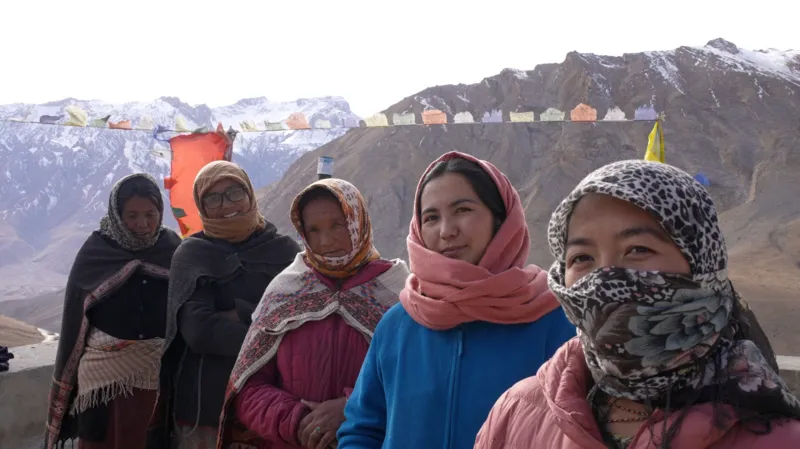
In one of India’s coldest and most remote regions, a group of women have taken on an unlikely role: protecting one of Asia’s most elusive predators, the snow leopard.
Snow leopards are found in just 12 countries across Central and South Asia. India is home to one of the world’s largest populations, with a nationwide survey in 2023 – the first comprehensive count ever carried out in the country – estimating more than 700 animals, .
One of the places they roam is around Kibber village in Himachal Pradesh state’s Spiti Valley, a stark, high-altitude cold desert along the Himalayan belt. Here, snow leopards are often called the “ghosts of the mountains”, slipping silently across rocky slopes and rarely revealing themselves.
For generations, the animals were seen largely as a threat, for attacking livestock. But attitudes in Kibber and neighbouring villages are beginning to shift, as people increasingly recognise the snow leopard’s role as a top predator in the food chain and its importance in maintaining the region’s fragile mountain ecosystem.
Nearly a dozen local women are now working alongside the Himachal Pradesh forest department and conservationists to track and protect the species, playing a growing role in conservation efforts.
Locally, the snow leopard is known as Shen and the women call their group “Shenmo”. Trained to install and monitor camera traps, they handle devices fitted with unique IDs and memory cards that automatically photograph snow leopards as they pass.
“Earlier, men used to go and install the cameras and we kept wondering why couldn’t we do it too,” says Lobzang Yangchen, a local coordinator working with a small group supported by the non-profit Nature Conservation Foundation (NCF) in collaboration with the forest department.
Yangchen was among the women who helped collect data for Himachal Pradesh’s snow leopard survey in 2024, which found that the state was home to 83 snow leopards – up from 51 in 2021.

The survey documented snow leopards and 43 other species using camera traps spread across an area of nearly 26,000sq km (10,000sq miles). Individual leopards were identified by the unique rosette patterns on their fur, a standard technique used for spotted big cats. The findings are now feeding into wider conservation and habitat-management plans.
“Their contribution was critical to identifying individual animals,” says Goldy Chhabra, deputy conservator of forests with the Spiti Wildlife Division.
Collecting the data is demanding work. Most of it takes place in winter, when heavy snowfall pushes snow leopards and their prey to lower altitudes, making their routes easier to track.
On survey days, the women wake up early, finish household chores and gather at a base camp before travelling by vehicle as far as the terrain allows. From there, they trek several kilometres to reach camera sites, often at altitudes above 14,000ft (4,300m), where the thin air makes even simple movement exhausting.
The BBC accompanied the group on one such trek in December. After hours of walking in biting cold, the women suddenly stopped on a narrow trail.
Yangchen points to pugmarks in the dust: “This shows the snow leopard has been here recently. These pugmarks are fresh.”
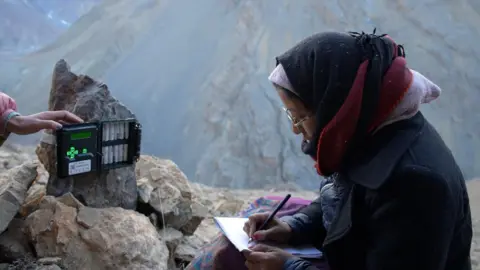
Along with pugmarks, the team looks for other signs, including scrapes and scent‑marking spots, before carefully fixing a camera to a rock along the trail.
One woman then carries out a “walk test”, crawling along the path to check whether the camera’s height and angle will capture a clear image.
The group then moves on to older sites, retrieving memory cards and replacing batteries installed weeks earlier.
By mid-afternoon, they return to camp to log and analyse the images using specialised software – tools many had never encountered before.
“I studied only until grade five,” says Chhering Lanzom. “At first, I was scared to use the computer. But slowly, we learned how to use the keyboard and mouse.”
The women joined the camera-trapping programme in 2023. Initially, conservation was not their motivation. But winters in the Spiti Valley are long and quiet, with little agricultural work to fall back on.
“At first, this work on snow leopards didn’t interest us,” Lobzang says. “We joined because we were curious and we could earn a small income.”
The women earn between 500 ($5.46; £4) and 700 rupees a day.
But beyond the money, the work has helped transform how the community views the animal.
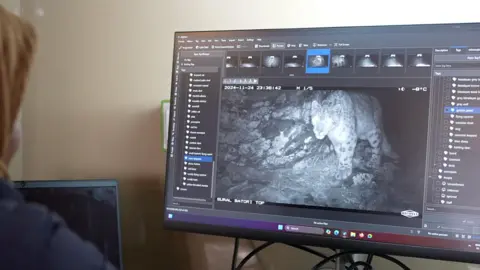
“Earlier, we thought the snow leopard was our enemy,” says Dolma Zangmo, a local resident. “Now we think their conservation is important.”
Alongside survey work, the women help villagers access government insurance schemes for their livestock and promote the use of predator‑proof corrals – stone or mesh enclosures that protect animals at night.
Their efforts come at a time of growing recognition for the region. Spiti Valley has recently been included in the Cold Desert Biosphere Reserve, a Unesco-recognised network aimed at conserving fragile ecosystems while supporting local livelihoods.
As climate change reshapes the fragile trans-Himalayan landscape, conservationists say such community participation will be crucial to safeguarding species like the snow leopard.
“Once communities are involved, conservation becomes more sustainable,” says Deepshikha Sharma, programme manager with NCF’s High Altitudes initiative.
“These women are not just assisting, they are becoming practitioners of wildlife conservation and monitoring,” she adds.
As for the women, their work makes them feel closer to their home, the village and the mountains that raised them, they say.
“We were born here, this is all we know,” Lobzang says. “Sometimes we feel afraid because these snow leopards are after all predatory animals, but this is where we belong.”
[BBC]
Features
Freedom for giants: What Udawalawe really tells about human–elephant conflict
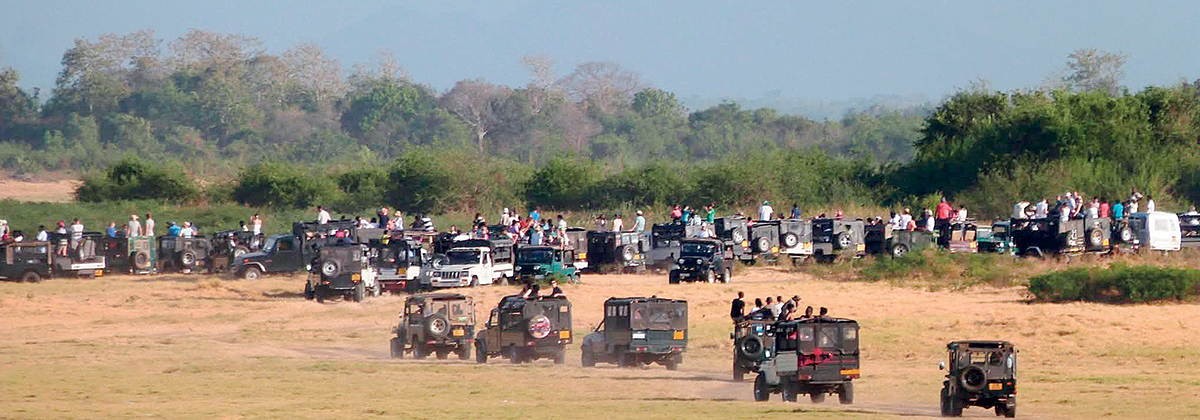
If elephants are truly to be given “freedom” in Udawalawe, the solution is not simply to open gates or redraw park boundaries. The map itself tells the real story — a story of shrinking habitats, broken corridors, and more than a decade of silent but relentless ecological destruction.
“Look at Udawalawe today and compare it with satellite maps from ten years ago,” says Sameera Weerathunga, one of Sri Lanka’s most consistent and vocal elephant conservation activists. “You don’t need complicated science. You can literally see what we have done to them.”
What we commonly describe as the human–elephant conflict (HEC) is, in reality, a land-use conflict driven by development policies that ignore ecological realities. Elephants are not invading villages; villages, farms, highways and megaprojects have steadily invaded elephant landscapes.
Udawalawe: From Landscape to Island
Udawalawe National Park was once part of a vast ecological network connecting the southern dry zone to the central highlands and eastern forests. Elephants moved freely between Udawalawe, Lunugamvehera, Bundala, Gal Oya and even parts of the Walawe river basin, following seasonal water and food availability.
Today, Udawalawe appears on the map as a shrinking green island surrounded by human settlements, monoculture plantations, reservoirs, electric fences and asphalt.
“For elephants, Udawalawe is like a prison surrounded by invisible walls,” Sameera explains. “We expect animals that evolved to roam hundreds of square nationakilometres to survive inside a box created by humans.”
Elephants are ecosystem engineers. They shape forests by dispersing seeds, opening pathways, and regulating vegetation. Their survival depends on movement — not containment. But in Udawalawa, movement is precisely what has been taken away.
Over the past decade, ancient elephant corridors have been blocked or erased by:
Irrigation and agricultural expansion
Tourism resorts and safari infrastructure
New roads, highways and power lines
Human settlements inside former forest reserves
“The destruction didn’t happen overnight,” Sameera says. “It happened project by project, fence by fence, without anyone looking at the cumulative impact.”
The Illusion of Protection
Sri Lanka prides itself on its protected area network. Yet most national parks function as ecological islands rather than connected systems.
“We think declaring land as a ‘national park’ is enough,” Sameera argues. “But protection without connectivity is just slow extinction.”
Udawalawe currently holds far more elephants than it can sustainably support. The result is habitat degradation inside the park, increased competition for resources, and escalating conflict along the boundaries.
“When elephants cannot move naturally, they turn to crops, tanks and villages,” Sameera says. “And then we blame the elephant for being a problem.”
The Other Side of the Map: Wanni and Hambantota
Sameera often points to the irony visible on the very same map. While elephants are squeezed into overcrowded parks in the south, large landscapes remain in the Wanni, parts of Hambantota and the eastern dry zone where elephant density is naturally lower and ecological space still exists.
“We keep talking about Udawalawe as if it’s the only place elephants exist,” he says. “But the real question is why we are not restoring and reconnecting landscapes elsewhere.”
The Hambantota MER (Managed Elephant Reserve), for instance, was originally designed as a landscape-level solution. The idea was not to trap elephants inside fences, but to manage land use so that people and elephants could coexist through zoning, seasonal access, and corridor protection.
“But what happened?” Sameera asks. “Instead of managing land, we managed elephants. We translocated them, fenced them, chased them, tranquilised them. And the conflict only got worse.”
The Failure of Translocation
For decades, Sri Lanka relied heavily on elephant translocation as a conflict management tool. Hundreds of elephants were captured from conflict zones and released into national parks like Udawalawa, Yala and Wilpattu.
The logic was simple: remove the elephant, remove the problem.
The reality was tragic.
“Most translocated elephants try to return home,” Sameera explains. “They walk hundreds of kilometres, crossing highways, railway lines and villages. Many die from exhaustion, accidents or gunshots. Others become even more aggressive.”
Scientific studies now confirm what conservationists warned from the beginning: translocation increases stress, mortality, and conflict. Displaced elephants often lose social structures, familiar landscapes, and access to traditional water sources.
“You cannot solve a spatial problem with a transport solution,” Sameera says bluntly.
In many cases, the same elephant is captured and moved multiple times — a process that only deepens trauma and behavioural change.
Freedom Is Not About Removing Fences
The popular slogan “give elephants freedom” has become emotionally powerful but scientifically misleading. Elephants do not need symbolic freedom; they need functional landscapes.
Real solutions lie in:
Restoring elephant corridors
Preventing development in key migratory routes
Creating buffer zones with elephant-friendly crops
Community-based land-use planning
Landscape-level conservation instead of park-based thinking
“We must stop treating national parks like wildlife prisons and villages like war zones,” Sameera insists. “The real battlefield is land policy.”
Electric fences, for instance, are often promoted as a solution. But fences merely shift conflict from one village to another.
“A fence does not create peace,” Sameera says. “It just moves the problem down the line.”
A Crisis Created by Humans
Sri Lanka loses more than 400 elephants and nearly 100 humans every year due to HEC — one of the highest rates globally.
Yet Sameera refuses to call it a wildlife problem.
“This is a human-created crisis,” he says. “Elephants are only responding to what we’ve done to their world.”
From expressways cutting through forests to solar farms replacing scrublands, development continues without ecological memory or long-term planning.
“We plan five-year political cycles,” Sameera notes. “Elephants plan in centuries.”
The tragedy is not just ecological. It is moral.
“We are destroying a species that is central to our culture, religion, tourism and identity,” Sameera says. “And then we act surprised when they fight back.”
The Question We Avoid Asking
If Udawalawe is overcrowded, if Yala is saturated, if Wilpattu is bursting — then the real question is not where to put elephants.
The real question is: Where have we left space for wildness in Sri Lanka?
Sameera believes the future lies not in more fences or more parks, but in reimagining land itself.
“Conservation cannot survive as an island inside a development ocean,” he says. “Either we redesign Sri Lanka to include elephants, or one day we’ll only see them in logos, statues and children’s books.”
And the map will show nothing but empty green patches — places where giants once walked, and humans chose. roads instead.
By Ifham Nizam
Features
Challenges faced by the media in South Asia in fostering regionalism
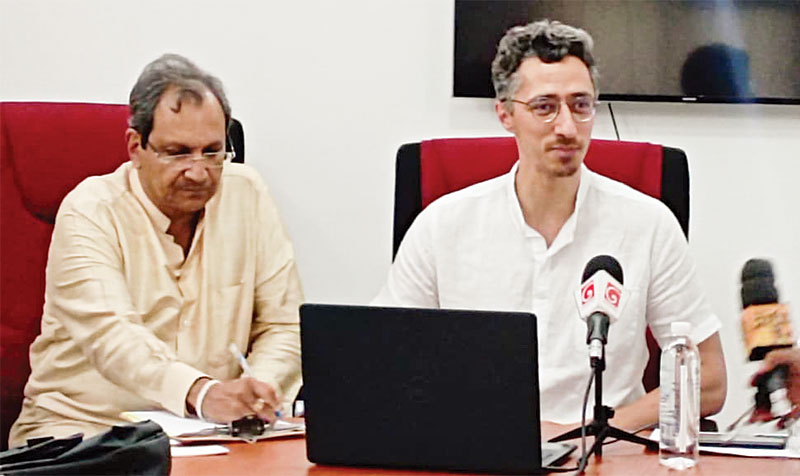
 SAARC or the South Asian Association for Regional Cooperation has been declared ‘dead’ by some sections in South Asia and the idea seems to be catching on. Over the years the evidence seems to have been building that this is so, but a matter that requires thorough probing is whether the media in South Asia, given the vital part it could play in fostering regional amity, has had a role too in bringing about SAARC’s apparent demise.
SAARC or the South Asian Association for Regional Cooperation has been declared ‘dead’ by some sections in South Asia and the idea seems to be catching on. Over the years the evidence seems to have been building that this is so, but a matter that requires thorough probing is whether the media in South Asia, given the vital part it could play in fostering regional amity, has had a role too in bringing about SAARC’s apparent demise.
That South Asian governments have had a hand in the ‘SAARC debacle’ is plain to see. For example, it is beyond doubt that the India-Pakistan rivalry has invariably got in the way, particularly over the past 15 years or thereabouts, of the Indian and Pakistani governments sitting at the negotiating table and in a spirit of reconciliation resolving the vexatious issues growing out of the SAARC exercise. The inaction had a paralyzing effect on the organization.
Unfortunately the rest of South Asian governments too have not seen it to be in the collective interest of the region to explore ways of jump-starting the SAARC process and sustaining it. That is, a lack of statesmanship on the part of the SAARC Eight is clearly in evidence. Narrow national interests have been allowed to hijack and derail the cooperative process that ought to be at the heart of the SAARC initiative.
However, a dimension that has hitherto gone comparatively unaddressed is the largely negative role sections of the media in the SAARC region could play in debilitating regional cooperation and amity. We had some thought-provoking ‘takes’ on this question recently from Roman Gautam, the editor of ‘Himal Southasian’.
Gautam was delivering the third of talks on February 2nd in the RCSS Strategic Dialogue Series under the aegis of the Regional Centre for Strategic Studies, Colombo, at the latter’s conference hall. The forum was ably presided over by RCSS Executive Director and Ambassador (Retd.) Ravinatha Aryasinha who, among other things, ensured lively participation on the part of the attendees at the Q&A which followed the main presentation. The talk was titled, ‘Where does the media stand in connecting (or dividing) Southasia?’.
Gautam singled out those sections of the Indian media that are tamely subservient to Indian governments, including those that are professedly independent, for the glaring lack of, among other things, regionalism or collective amity within South Asia. These sections of the media, it was pointed out, pander easily to the narratives framed by the Indian centre on developments in the region and fall easy prey, as it were, to the nationalist forces that are supportive of the latter. Consequently, divisive forces within the region receive a boost which is hugely detrimental to regional cooperation.
Two cases in point, Gautam pointed out, were the recent political upheavals in Nepal and Bangladesh. In each of these cases stray opinions favorable to India voiced by a few participants in the relevant protests were clung on to by sections of the Indian media covering these trouble spots. In the case of Nepal, to consider one example, a young protester’s single comment to the effect that Nepal too needed a firm leader like Indian Prime Minister Narendra Modi was seized upon by the Indian media and fed to audiences at home in a sensational, exaggerated fashion. No effort was made by the Indian media to canvass more opinions on this matter or to extensively research the issue.
In the case of Bangladesh, widely held rumours that the Hindus in the country were being hunted and killed, pogrom fashion, and that the crisis was all about this was propagated by the relevant sections of the Indian media. This was a clear pandering to religious extremist sentiment in India. Once again, essentially hearsay stories were given prominence with hardly any effort at understanding what the crisis was really all about. There is no doubt that anti-Muslim sentiment in India would have been further fueled.
Gautam was of the view that, in the main, it is fear of victimization of the relevant sections of the media by the Indian centre and anxiety over financial reprisals and like punitive measures by the latter that prompted the media to frame their narratives in these terms. It is important to keep in mind these ‘structures’ within which the Indian media works, we were told. The issue in other words, is a question of the media completely subjugating themselves to the ruling powers.
Basically, the need for financial survival on the part of the Indian media, it was pointed out, prompted it to subscribe to the prejudices and partialities of the Indian centre. A failure to abide by the official line could spell financial ruin for the media.
A principal question that occurred to this columnist was whether the ‘Indian media’ referred to by Gautam referred to the totality of the Indian media or whether he had in mind some divisive, chauvinistic and narrow-based elements within it. If the latter is the case it would not be fair to generalize one’s comments to cover the entirety of the Indian media. Nevertheless, it is a matter for further research.
However, an overall point made by the speaker that as a result of the above referred to negative media practices South Asian regionalism has suffered badly needs to be taken. Certainly, as matters stand currently, there is a very real information gap about South Asian realities among South Asian publics and harmful media practices account considerably for such ignorance which gets in the way of South Asian cooperation and amity.
Moreover, divisive, chauvinistic media are widespread and active in South Asia. Sri Lanka has a fair share of this species of media and the latter are not doing the country any good, leave alone the region. All in all, the democratic spirit has gone well into decline all over the region.
The above is a huge problem that needs to be managed reflectively by democratic rulers and their allied publics in South Asia and the region’s more enlightened media could play a constructive role in taking up this challenge. The latter need to take the initiative to come together and deliberate on the questions at hand. To succeed in such efforts they do not need the backing of governments. What is of paramount importance is the vision and grit to go the extra mile.
-

 Business6 days ago
Business6 days agoHayleys Mobility ushering in a new era of premium sustainable mobility
-

 Business3 days ago
Business3 days agoSLIM-Kantar People’s Awards 2026 to recognise Sri Lanka’s most trusted brands and personalities
-

 Business6 days ago
Business6 days agoAdvice Lab unveils new 13,000+ sqft office, marking major expansion in financial services BPO to Australia
-

 Business6 days ago
Business6 days agoArpico NextGen Mattress gains recognition for innovation
-

 Business5 days ago
Business5 days agoAltair issues over 100+ title deeds post ownership change
-

 Editorial6 days ago
Editorial6 days agoGovt. provoking TUs
-

 Business5 days ago
Business5 days agoSri Lanka opens first country pavilion at London exhibition
-

 Business4 days ago
Business4 days agoAll set for Global Synergy Awards 2026 at Waters Edge

